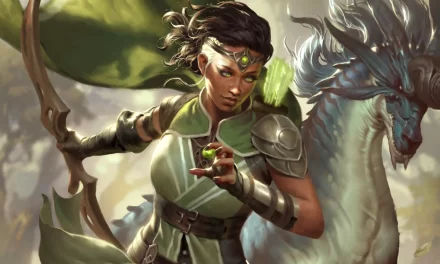Beyond swinging swords and slinging spells, some characters may find themselves more drawn to the social skills of D&D 5e. These skills help to increase the immersion in the story that your group is telling.
Things like haggling with a shopkeeper, fast-talking your way past a guard, or convincing a group of bandits to back down are all examples of social actions that your character can take.
More often than not, these moments come down to a mix of roleplaying and dice rolls. For the rolls, the skills that you may find yourself using in these social encounters are Persuasion, Deception, Intimidation, Insight, and Performance.
So today we’re talking about the social skills in D&D 5e, how they work, and when to use them!
Persuasion in D&D 5e
For those who prefer to take an honest and diplomatic approach to social encounters, we have the Persuasion skill.
The goal of a Persuasion check is to convince someone of something without resorting to deception or enchantment. This can result in NPCs doing favors for a character, helping them out in a pinch, or other such things that someone would do for a reasonably friendly person.
Persuasion is the most commonly used social skill and it has a very wide range of applications.
A combination of good roleplaying and Persuasion checks can easily lead to certain NPCs becoming contacts for the party. Personally, this is one of my favorite ways to further immerse the characters in the world.
Persuasion can also be a great tool for getting past certain gatekeepers. The party needs to quickly get an audience with the king but has to first speak with his chamberlain? A good persuasion roll and clever reason why it also benefits the chamberlain to speed up the process might be enough to hurry things along!
If you suspect that a shopkeeper might be open to some haggling, a good Persuasion check may get you a better deal on adventuring supplies! Who knows? They might be happy to discount the price in exchange for a favor.
Persuasion checks are always made in good faith. If you’re bending the truth, it becomes a Deception check. Likewise, if you’re coming off too severe it may end up becoming more of an Intimidation check.
Deception in D&D 5e
If you aren’t inclined to keep things on the “up and up” or would prefer to take some “creative liberties” with the truth, the Deception skill is for you.
Deception ranges from simply attempting to conceal the truth to outright lying about something. Characters who favor the use of disguises and the like will want to have proficiency in Deception checks.
As with the other social skills in D&D 5e, Deception uses roleplaying and skill checks in a way that can have rippling effects in the story.
A character may successfully con a merchant only to return to the town later and find wanted posters with their likeness on them once the merchant realizes that they’ve been fooled. Maybe the crafty transmutation wizard sold the merchant a silver trinket that returned to its original wooden form an hour later.
On the other hand, the character may have passed themselves off as an ambassador from some far-off land and routinely receives a grand welcome when they return to the town. This allows the character and their allies to enjoy luxuries that are typically reserved for such diplomatic figures. But what might happen when the actual ambassador from that far-off land happens to arrive after several months of this ruse?
The nature of lies is that the longer they continue, the more lies must be told to cover it up. Because of this, situations can arise that complicate an ongoing lie and create the need for more Deception checks. These can often lead to memorable moments!
However, as a DM, not every single Deception check should result in some huge ripple. A quick lie to get past a guard or make some money gambling can be just as fun without needing an entire plot hook. If there’s always strings attached, players won’t be inclined to use the Deception skill.
While that’s probably a good lesson in telling the truth, sometimes you just want your D&D character to lie, cheat, or steal!
Intimidation in D&D 5e
Sometimes social situations in D&D require a little extra convincing.
“I’m not going to hurt you. I’d never dream of it!” the Bard says with a grin, “but my friend over here isn’t as patient as I am…”
The captured spy turns their attention to the grinning Barbarian who is now cracking their knuckles in anticipation.
“Ok! Ok! I’ll talk!” the spy yells.
Intimidation checks cover things like getting information out of a prisoner, forcing someone to take a course of action, or aggressively encouraging them to reconsider a decision.
These checks often take the form of threats, hostile actions, or violence. Ultimately, the goal of an Intimidation check is to influence someone to do what you want them to. More often than not, Intimidation checks end with the words “or else…”
Performance in D&D 5e
Performance is pretty self-explanatory.
Whatever form of entertainment your character seeks to provide to an audience, this will be the check that determines how well your performance goes over. You may find yourself with a room full of new fans or they might be the very definition of a tough crowd.
This is most commonly used by characters who want to earn some extra money during the party’s downtime. A successful performance in the local tavern can go a long way in lining the party’s pockets!
Insight in D&D 5e
The last of the social skills in D&D 5e is the only one that relies on characters’ Wisdom instead of their Charisma.
With an Insight check, a character attempts to determine someone else’s true intentions. This may take the form of telling if someone is lying or trying to figure out someone’s next move. You may also take it a step further as trying to get a sense of someone’s general emotional state.
When rolling Insight, you are paying attention to a creature’s body language, speech, and mannerisms. They might make unnatural eye contact or seem twitchy and defensive. After all, everybody has a “tell” when they’re lying. Though some people may be better at hiding it than others…
Conclusion – How and When To Use D&D Social Skills
One of the things that I love most about D&D is that social encounters can be just as memorable and exciting as combat encounters. Interacting with the world and the characters in it can add tons of unique twists and turns to a story.
Because of this, it’s wise to know how to use the various social skills in D&D 5e. This is especially true if your character is more of the “face” of the party!
For more about character roles such as the “face,” check out our article on Party Composition!









